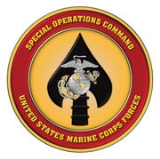
Marine Forces Special Operations Command
Encyclopedia
United States Marine Corps Special Operations Command (MARSOC) is a component command of the US Special Operations Command (SOCOM)
that comprises the Marine Corps'
contribution to SOCOM. Its core capabilities are direct action
, special reconnaissance
and foreign internal defense
. MARSOC has also been directed to conduct counter-terrorism
, information operations
, and unconventional warfare
.
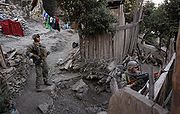 Its creation was announced on 1 November 2005 by US Defense Secretary Donald Rumsfeld
Its creation was announced on 1 November 2005 by US Defense Secretary Donald Rumsfeld
, following a meeting between him, the USSOCOM commander General Bryan D. Brown
, and the Marine Corps Commandant
General Michael Hagee
on 28 October 2005. MARSOC was officially activated on 24 February 2006 with ceremonies at Camp Lejeune, North Carolina.
The potential participation of the Marine Corps in SOCOM
has been controversial since SOCOM was formed in 1986. At the time, Marine Corps leaders felt that their Force Reconnaissance
units were best kept in the Marine Corps' MAGTF
command structure, and that the detachment of an "elite" Marine Special Operations unit from the Marine Corps would be to the detriment of the Marine Corps as a whole. A re-evaluation following the 11 September attacks and the War on Terrorism
, along with new policy established by Secretary Rumsfeld
and then Commandant Gen. James L. Jones
at The Pentagon
, caused the Marine Corps to work towards integration with SOCOM. The establishment of MARSOC represented the most significant step towards that goal, and followed the establishment of MCSOCOM Detachment One
(DET1), a small Marine Corps detachment formed as a pilot program to test Marine Corps integration into SOCOM. It was made up of mostly Force Recon Marines from 1st and 2nd Force Reconnaissance Companies along with other hand picked support men and served with Navy SEALs
under Naval Special Warfare Group One. Detachment 1 conducted a multitude of special operations in Iraq alongside their Special Operations brothers of the sister services. SOCOM conducted a study of the unit's deployment, which clearly indicated success and strong performance. Detachment 1 was disbanded in 2006 soon after the creation of MARSOC.
The finalization of MARSOC's organization began in 2007, after it was realized that a MARSOC unit needed to be able to be part of a Joint Special Operations Task Force and that unit structure was unbalanced.
The first Marine Special Operations Individual Training Course began at Camp Lejeune on 6 October 2008.

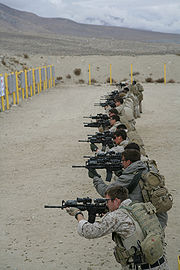 MARSOC comprises roughly 2,500 Marines and sailors, and is currently commanded by Major General
MARSOC comprises roughly 2,500 Marines and sailors, and is currently commanded by Major General
Paul E. Lefebvre
. MARSOC's organization was finalized in 2007. The base unit of MARSOC is the fourteen-man Marine Special Operations Team (MSOT), which is commanded by a Captain (O-3). MARSOC is based at Camp Lejeune
, North Carolina
and is split into three subordinate commands:
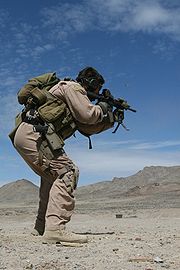
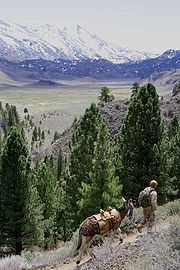
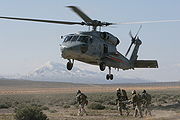 Selection of the right personnel begins with a rigorous screening process designed to identify the right Marines for the right billet within MARSOC. Operational billets are open only to males. Only those Marines wanting to serve as special operators, as opposed to support, must attend Assessment and Selection (A&S); however, all Marines are screened to ensure that the Marines joining MARSOC meet the established prerequisites for duty within the command. Screening takes place in 3 stages: record screening, physical screening, and a psychological and medical evaluation.
Selection of the right personnel begins with a rigorous screening process designed to identify the right Marines for the right billet within MARSOC. Operational billets are open only to males. Only those Marines wanting to serve as special operators, as opposed to support, must attend Assessment and Selection (A&S); however, all Marines are screened to ensure that the Marines joining MARSOC meet the established prerequisites for duty within the command. Screening takes place in 3 stages: record screening, physical screening, and a psychological and medical evaluation.
who can operate across the spectrum of special operations in small teams under spartan conditions. ITC uses a building block approach; the training rigor will systematically increase to mimic the complexity and stresses of combat. During ITC students are under constant observation from the instructor cadre as well as their peers. ITC is broken down into four training phases:
will be assigned to one of the three Marine Special Operations Battalions.
are required to undergo continual language training. However, based on ability, certain Marines will be selected for follow-on language training at an Advanced Linguistics Course.
does not end with ITC. Marines will continue training at their assigned battalion for another 18 months. In addition, the MSOS offers advanced-level courses in a number of subject areas: Special Reconnaissance
, Close Quarters Battle
, Sniper
, Breaching
, and weapons employment. Marine special operators
also attend U.S. Army Airborne School and United States Marine Corps Combatant Diver Course
.
United States Special Operations Command
The United States Special Operations Command is the Unified Combatant Command charged with overseeing the various Special Operations Commands of the Army, Air Force, Navy and Marine Corps of the United States Armed Forces. The command is part of the Department of Defense...
that comprises the Marine Corps'
United States Marine Corps
The United States Marine Corps is a branch of the United States Armed Forces responsible for providing power projection from the sea, using the mobility of the United States Navy to deliver combined-arms task forces rapidly. It is one of seven uniformed services of the United States...
contribution to SOCOM. Its core capabilities are direct action
Direct action (military)
In the context of military special operations, direct action consists of: "Short-duration strikes and other small-scale offensive actions conducted as a special operation in hostile, denied, or politically sensitive environments and which employ specialized military capabilities to seize, destroy,...
, special reconnaissance
Special reconnaissance
Special reconnaissance is conducted by small units of highly trained military personnel, usually from special forces units or military intelligence organisations, who operate behind enemy lines, avoiding direct combat and detection by the enemy. As a role, SR is distinct from commando operations,...
and foreign internal defense
Foreign internal defense
Foreign internal defense is a term used by a number of Western militaries, including the United States, France and the United Kingdom, to describe an approach to combating actual or threatened insurgency in a foreign state called the Host Nation . The term counter-insurgency is more commonly used...
. MARSOC has also been directed to conduct counter-terrorism
Counter-terrorism
Counter-terrorism is the practices, tactics, techniques, and strategies that governments, militaries, police departments and corporations adopt to prevent or in response to terrorist threats and/or acts, both real and imputed.The tactic of terrorism is available to insurgents and governments...
, information operations
Information warfare
The term Information Warfare is primarily an American concept involving the use and management of information technology in pursuit of a competitive advantage over an opponent...
, and unconventional warfare
Unconventional warfare
Unconventional warfare is the opposite of conventional warfare. Where conventional warfare is used to reduce an opponent's military capability, unconventional warfare is an attempt to achieve military victory through acquiescence, capitulation, or clandestine support for one side of an existing...
.
History and lineage

Donald Rumsfeld
Donald Henry Rumsfeld is an American politician and businessman. Rumsfeld served as the 13th Secretary of Defense from 1975 to 1977 under President Gerald Ford, and as the 21st Secretary of Defense from 2001 to 2006 under President George W. Bush. He is both the youngest and the oldest person to...
, following a meeting between him, the USSOCOM commander General Bryan D. Brown
Bryan D. Brown
General Bryan Douglas "Doug" Brown is a former Commander, U.S. Special Operations Command . As USSOCOM's combatant commander, he was responsible for all unified special operations forces, both active duty and reserve....
, and the Marine Corps Commandant
Commandant of the Marine Corps
The Commandant of the Marine Corps is normally the highest ranking officer in the United States Marine Corps and is a member of the Joint Chiefs of Staff...
General Michael Hagee
Michael Hagee
General Michael W. Hagee was the 33rd Commandant of the United States Marine Corps , succeeding James L. Jones on January 13, 2003. He stepped down as Commandant two months before the end of his four-year term, and was succeeded by General James T. Conway on November 13, 2006...
on 28 October 2005. MARSOC was officially activated on 24 February 2006 with ceremonies at Camp Lejeune, North Carolina.
The potential participation of the Marine Corps in SOCOM
United States Special Operations Command
The United States Special Operations Command is the Unified Combatant Command charged with overseeing the various Special Operations Commands of the Army, Air Force, Navy and Marine Corps of the United States Armed Forces. The command is part of the Department of Defense...
has been controversial since SOCOM was formed in 1986. At the time, Marine Corps leaders felt that their Force Reconnaissance
United States Marine Corps Force Reconnaissance
The Force Reconnaissance Companies , are one of the United States Marine Corps's special operations "capable" forces that provide essential elements of military intelligence to the command element of the Marine Air-Ground Task Force ; supporting the landing or joint task force commanders, and...
units were best kept in the Marine Corps' MAGTF
Marine Air-Ground Task Force
The Marine Air-Ground Task Force is a term used by the United States Marine Corps to describe the principal organization for all missions across the range of military operations. MAGTFs are a balanced air-ground, combined arms task organization of Marine Corps forces under a single commander that...
command structure, and that the detachment of an "elite" Marine Special Operations unit from the Marine Corps would be to the detriment of the Marine Corps as a whole. A re-evaluation following the 11 September attacks and the War on Terrorism
War on Terrorism
The War on Terror is a term commonly applied to an international military campaign led by the United States and the United Kingdom with the support of other North Atlantic Treaty Organisation as well as non-NATO countries...
, along with new policy established by Secretary Rumsfeld
Donald Rumsfeld
Donald Henry Rumsfeld is an American politician and businessman. Rumsfeld served as the 13th Secretary of Defense from 1975 to 1977 under President Gerald Ford, and as the 21st Secretary of Defense from 2001 to 2006 under President George W. Bush. He is both the youngest and the oldest person to...
and then Commandant Gen. James L. Jones
James L. Jones
James Logan Jones, Jr. is the former United States National Security Advisor and a retired United States Marine Corps General....
at The Pentagon
The Pentagon
The Pentagon is the headquarters of the United States Department of Defense, located in Arlington County, Virginia. As a symbol of the U.S. military, "the Pentagon" is often used metonymically to refer to the Department of Defense rather than the building itself.Designed by the American architect...
, caused the Marine Corps to work towards integration with SOCOM. The establishment of MARSOC represented the most significant step towards that goal, and followed the establishment of MCSOCOM Detachment One
MCSOCOM Detachment One
Marine Corps Special Operations Command Detachment One , was a pilot program to assess the value of Marine special operations forces permanently detached to the United States Special Operations Command. It was commanded by Col. Robert J. Coates, former commanding officer of 1st Force Reconnaissance...
(DET1), a small Marine Corps detachment formed as a pilot program to test Marine Corps integration into SOCOM. It was made up of mostly Force Recon Marines from 1st and 2nd Force Reconnaissance Companies along with other hand picked support men and served with Navy SEALs
United States Navy SEALs
The United States Navy's Sea, Air and Land Teams, commonly known as Navy SEALs, are the U.S. Navy's principal special operations force and a part of the Naval Special Warfare Command as well as the maritime component of the United States Special Operations Command.The acronym is derived from their...
under Naval Special Warfare Group One. Detachment 1 conducted a multitude of special operations in Iraq alongside their Special Operations brothers of the sister services. SOCOM conducted a study of the unit's deployment, which clearly indicated success and strong performance. Detachment 1 was disbanded in 2006 soon after the creation of MARSOC.
The finalization of MARSOC's organization began in 2007, after it was realized that a MARSOC unit needed to be able to be part of a Joint Special Operations Task Force and that unit structure was unbalanced.
The first Marine Special Operations Individual Training Course began at Camp Lejeune on 6 October 2008.
Organization


Major General
Major general or major-general is a military rank used in many countries. It is derived from the older rank of sergeant major general. A major general is a high-ranking officer, normally subordinate to the rank of lieutenant general and senior to the ranks of brigadier and brigadier general...
Paul E. Lefebvre
Paul E. Lefebvre
Major General Paul E. Lefebvre is a Marine Corps officer and the third Commanding General of the Marine Corps Forces Special Operations Command .-Early life and education:...
. MARSOC's organization was finalized in 2007. The base unit of MARSOC is the fourteen-man Marine Special Operations Team (MSOT), which is commanded by a Captain (O-3). MARSOC is based at Camp Lejeune
Marine Corps Base Camp Lejeune
Marine Corps Base Camp Lejeune is a United States military training facility in North Carolina. The base's of beaches make it a major area for amphibious assault training, and its location between two deep-water ports allows for fast deployments.The main base is supplemented by five satellite...
, North Carolina
North Carolina
North Carolina is a state located in the southeastern United States. The state borders South Carolina and Georgia to the south, Tennessee to the west and Virginia to the north. North Carolina contains 100 counties. Its capital is Raleigh, and its largest city is Charlotte...
and is split into three subordinate commands:
| Name | Insignia | Headquarters | Description |
|---|---|---|---|
| Marine Special Operations Regiment Marine Special Operations Regiment (United States) The Marine Special Operations Regiment is a special operations unit of the United States Marine Corps and the principal combat component of the Marine Corps Special Operations Command... |
Camp Lejeune, NC Marine Corps Base Camp Lejeune Marine Corps Base Camp Lejeune is a United States military training facility in North Carolina. The base's of beaches make it a major area for amphibious assault training, and its location between two deep-water ports allows for fast deployments.The main base is supplemented by five satellite... and Camp Pendleton, CA Marine Corps Base Camp Pendleton Marine Corps Base Camp Pendleton is the major West Coast base of the United States Marine Corps and serves as its prime amphibious training base... |
MSOR consists of a Headquarters Company and three Marine Special Operations Battalions (1st, 2nd and 3rd). The MSOBs are tasked with direct action Direct action (military) In the context of military special operations, direct action consists of: "Short-duration strikes and other small-scale offensive actions conducted as a special operation in hostile, denied, or politically sensitive environments and which employ specialized military capabilities to seize, destroy,... , special reconnaissance Special reconnaissance Special reconnaissance is conducted by small units of highly trained military personnel, usually from special forces units or military intelligence organisations, who operate behind enemy lines, avoiding direct combat and detection by the enemy. As a role, SR is distinct from commando operations,... , counter-terrorism Counter-terrorism Counter-terrorism is the practices, tactics, techniques, and strategies that governments, militaries, police departments and corporations adopt to prevent or in response to terrorist threats and/or acts, both real and imputed.The tactic of terrorism is available to insurgents and governments... , and information operations. They are also trained to carry out peacetime foreign internal defense Foreign internal defense Foreign internal defense is a term used by a number of Western militaries, including the United States, France and the United Kingdom, to describe an approach to combating actual or threatened insurgency in a foreign state called the Host Nation . The term counter-insurgency is more commonly used... and unconventional warfare Unconventional warfare Unconventional warfare is the opposite of conventional warfare. Where conventional warfare is used to reduce an opponent's military capability, unconventional warfare is an attempt to achieve military victory through acquiescence, capitulation, or clandestine support for one side of an existing... . This includes giving military training to friendly foreign nations. Each MSOB consists of four Marine Special Operations Companies (MSOCs) that contain four Marine Special Operations Teams (MSOTs) in each Company. The organization allows a Team to operate on its own if needed, but maintains the ability to operate as part of a bigger unit such as an MSOC or SOTF, similar to Army Special Forces ODA/B. The core personnel strength of the MSOBs was initially drafted from Force Reconnaissance Marines United States Marine Corps Force Reconnaissance The Force Reconnaissance Companies , are one of the United States Marine Corps's special operations "capable" forces that provide essential elements of military intelligence to the command element of the Marine Air-Ground Task Force ; supporting the landing or joint task force commanders, and... . |
|
| Marine Special Operations Support Group | Camp Lejeune, NC | Comprises 400 personnel, contains the Command's administrative, intelligence Military intelligence Military intelligence is a military discipline that exploits a number of information collection and analysis approaches to provide guidance and direction to commanders in support of their decisions.... , and support assets. |
|
| Marine Special Operations Intelligence Battalion | Camp Lejeune, NC | Provides intelligence support at all operational levels in order to support training and operations worldwide with mission-specific intelligence capability. | |
| Marine Special Operations School |  |
Camp Lejeune, NC | Conducts screening, training, selection, assessment, and development functions for MARSOC. |
Screening



Assessment and Selection
Once a Marine is qualified through the MARSOC Recruiters screening process, he will be assigned to the Assessment and Selection (A&S) Program. A&S is mentally and physically challenging. The program is conducted 3 times a year at an undisclosed location following the 3 week Assessment and Selection Preparatory and Orientation Course.Individual Training Course
The Individual Training Course is a physically and mentally challenging 7-month course designed to produce Critical Skills OperatorsMOS 0372
MOS 0372 is the United States Marine Corps Military Occupational Specialty for Critical Skills Operator. Slated to be active as of October 1, 2011, the MOS was created to act as the primary job field for Special Operations Infantry Marines assigned to Marine Corps Special Operations...
who can operate across the spectrum of special operations in small teams under spartan conditions. ITC uses a building block approach; the training rigor will systematically increase to mimic the complexity and stresses of combat. During ITC students are under constant observation from the instructor cadre as well as their peers. ITC is broken down into four training phases:
Phase 1
Phase 1 trains and evaluates students in the basic skill sets required of all special operators. Physical fitness, swimming and hand-to-hand combat are stressed in a PT program designed around endurance, functional fitness and amphibious training. This physical training program will continue throughout the course and has been designed to prepare the student for the unique demands of special operations. Field skills including: navigation, patrolling, Survival, Evasion, Resistance, and Escape (SERE), Tactical Combat Casualty Care (TCCC). Mission planning, Fire support training and Communications round out the first phase.Phase 2
Phase 2 builds upon the foundation of Phase 1, training the student in small boat and scout swimmer operations, crew served weapons, demolitions, photography and information collection and reporting. Students will be evaluated in two Full Mission Profile exercises “Operation Raider Spirit”, a 2 week exercise focused on patrolling and combat operations, and “Operation Stingray Fury” focused on urban and rural reconnaissance.Phase 3
Student will be trained in rifle and pistol combat marksmanship and will then learn the tactics, techniques and procedures need to serve as a member of a Marine Special Operations Team during assault operations. This Phase culminates in a series of full mission profile precision raids on rural and urban objectives during “Operation Guile Strike”.Phase 4
In the final phase, students will receive instruction on Irregular Warfare operations. The course culminates with “Operation Derna Bridge”. Derna Bridge will require the student to use all of the skills mastered throughout the course while training, advising and operating with a Partner Nation / Irregular force. Newly graduated Marine special operatorsMOS 0372
MOS 0372 is the United States Marine Corps Military Occupational Specialty for Critical Skills Operator. Slated to be active as of October 1, 2011, the MOS was created to act as the primary job field for Special Operations Infantry Marines assigned to Marine Corps Special Operations...
will be assigned to one of the three Marine Special Operations Battalions.
Language Training
All Marine special operatorsMOS 0372
MOS 0372 is the United States Marine Corps Military Occupational Specialty for Critical Skills Operator. Slated to be active as of October 1, 2011, the MOS was created to act as the primary job field for Special Operations Infantry Marines assigned to Marine Corps Special Operations...
are required to undergo continual language training. However, based on ability, certain Marines will be selected for follow-on language training at an Advanced Linguistics Course.
Advanced Training
Training and educating Marine special operatorsMOS 0372
MOS 0372 is the United States Marine Corps Military Occupational Specialty for Critical Skills Operator. Slated to be active as of October 1, 2011, the MOS was created to act as the primary job field for Special Operations Infantry Marines assigned to Marine Corps Special Operations...
does not end with ITC. Marines will continue training at their assigned battalion for another 18 months. In addition, the MSOS offers advanced-level courses in a number of subject areas: Special Reconnaissance
Special reconnaissance
Special reconnaissance is conducted by small units of highly trained military personnel, usually from special forces units or military intelligence organisations, who operate behind enemy lines, avoiding direct combat and detection by the enemy. As a role, SR is distinct from commando operations,...
, Close Quarters Battle
Close quarters battle
Close quarters combat or close quarters battle is a type of fighting in which small units engage the enemy with personal weapons at very short range, potentially to the point of hand-to-hand combat or fighting with hand weapons such as swords or knives...
, Sniper
Sniper
A sniper is a marksman who shoots targets from concealed positions or distances exceeding the capabilities of regular personnel. Snipers typically have specialized training and distinct high-precision rifles....
, Breaching
Door breaching
Door breaching is a process used by military, police, or emergency services to force open closed and/or locked doors. A wide range of methods are available, one or more of which may be used in any given situation...
, and weapons employment. Marine special operators
MOS 0372
MOS 0372 is the United States Marine Corps Military Occupational Specialty for Critical Skills Operator. Slated to be active as of October 1, 2011, the MOS was created to act as the primary job field for Special Operations Infantry Marines assigned to Marine Corps Special Operations...
also attend U.S. Army Airborne School and United States Marine Corps Combatant Diver Course
United States Marine Corps Combatant Diver Course
The USMC Combatant Diver Course is taught at the Navy Diving and Salvage Training Center, Naval Support Activity Panama City, Panama City, Florida. Both of the Marine Air-Ground Task Force reconnaissance assets, FMF Recon and MarDiv Recon, widely use combatant diving...
.
Current Commander
- Major General Paul E. LefebvrePaul E. LefebvreMajor General Paul E. Lefebvre is a Marine Corps officer and the third Commanding General of the Marine Corps Forces Special Operations Command .-Early life and education:...
See also
- Organization of the United States Marine CorpsOrganization of the United States Marine CorpsThe United States Marine Corps is organized within the Department of the Navy, which is led by the Secretary of the Navy . The most senior Marine officer is the Commandant of the Marine Corps, responsible for organizing, recruiting, training, and equipping the Marine Corps so that it is ready for...
- United States Special Operations CommandUnited States Special Operations CommandThe United States Special Operations Command is the Unified Combatant Command charged with overseeing the various Special Operations Commands of the Army, Air Force, Navy and Marine Corps of the United States Armed Forces. The command is part of the Department of Defense...
- Special OperationsSpecial operationsSpecial operations are military operations that are considered "special" .Special operations are typically performed independently or in conjunction with conventional military operations. The primary goal is to achieve a political or military objective where a conventional force requirement does...
- Central Intelligence AgencyCentral Intelligence AgencyThe Central Intelligence Agency is a civilian intelligence agency of the United States government. It is an executive agency and reports directly to the Director of National Intelligence, responsible for providing national security intelligence assessment to senior United States policymakers...
's Special Activities DivisionSpecial Activities DivisionThe Special Activities Division is a division in the United States Central Intelligence Agency's National Clandestine Service responsible for covert operations known as "special activities"... - United States Naval Special Warfare CommandUnited States Naval Special Warfare CommandThe United States Naval Special Warfare Command was commissioned on April 16, 1987, at Naval Amphibious Base Coronado in San Diego, California...
- MCSOCOM Detachment OneMCSOCOM Detachment OneMarine Corps Special Operations Command Detachment One , was a pilot program to assess the value of Marine special operations forces permanently detached to the United States Special Operations Command. It was commanded by Col. Robert J. Coates, former commanding officer of 1st Force Reconnaissance...
- MOS 0372MOS 0372MOS 0372 is the United States Marine Corps Military Occupational Specialty for Critical Skills Operator. Slated to be active as of October 1, 2011, the MOS was created to act as the primary job field for Special Operations Infantry Marines assigned to Marine Corps Special Operations...

